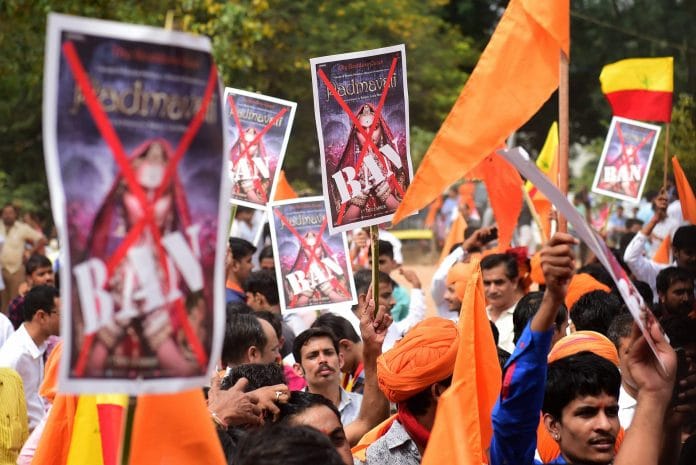For years, Indian liberals have fought for the right to freedom of artistic expression — the paintings of M. F. Husain, Jatin Das, movies like Fire and PK and readings of the Three Hundred Ramayanas.
As calls rise for a ban on the release of Padmavati — a film that valourises Rajput caste identity and glorifies sati, we ask:
Is Padmavati forcing Left-liberals and feminists into an awkward silence on the question of unqualified freedom of expression?
What do the movies Sexy Durga, Nude, and Padmavati have in common? They send out a chilling message to the creative community to install a humongous censor in their heads, and effectively wind up a vibrant film industry of over hundred years spanning across languages and regions shimmering with brilliance and radiance.
Creativity does not entail treading the beaten path. It involves questioning stereotypes, established conventions and especially obscurantist traditions. Indian cinema over the decades has done that successfully. It has been provocative and daring in its exploration of some of the darkest closets of our social milieu. Commercial, offbeat and even documentary films have been seething in their inquisition of outmoded value systems.
The only arbiter of this creative space is the Central Board of Film Certification, ubiquitously called the censor board. Only the board has the statutory authority to refuse certification or certify a film as U, A, or S i.e. fit for universal viewing, adult or special screening. Except this body, no state government and much less any vigilante group has the right to proscribe a film. It is another debate that the censor board too needs to be junked lock, stock and barrel.
Here are other sharp perspectives on Padmavati and the freedom of expression:
Rohit Chopra, Associate Professor, Santa Clara University
Hilal Ahmed, Associate Professor CSDS
Sabah K., journalist, ThePrint
Apar Gupta, lawyer
However, ever since the NDA/BJP government came to power, an atmosphere of extra legal censorship has become the prevailing norm where the majoritarian mainstream, skillfully subterfuged as the “loony fringe”, has been given an unbridled licence to assault creativity and even neutralise conscientious dissenters. Conformism with what this government considers to be their template of morality is being enforced through lynch mobs who now publicly hold out rewards for beheading and disemboweling artists.
IFFI 2017 kicks off in Goa under the menacing shadow of Article 19 of the Constitution of India that guarantees freedom of speech and expression being disfigured beyond recognition. Jury-approved movies have been unceremoniously kicked out for not making the cut on a spurious virtue quotient.
The creative community and especially the liberals do not need to judge the merits of any artistic expression, historical or concurrent. That is for the audiences to do. They collectively need to stand up for the principle – let freedom reign. It is the only way to defang the great evil that stalks our land.
Manish Tewari is a lawyer, former UPA minister, and Distinguished Senior Fellow, Atlantic Council.






